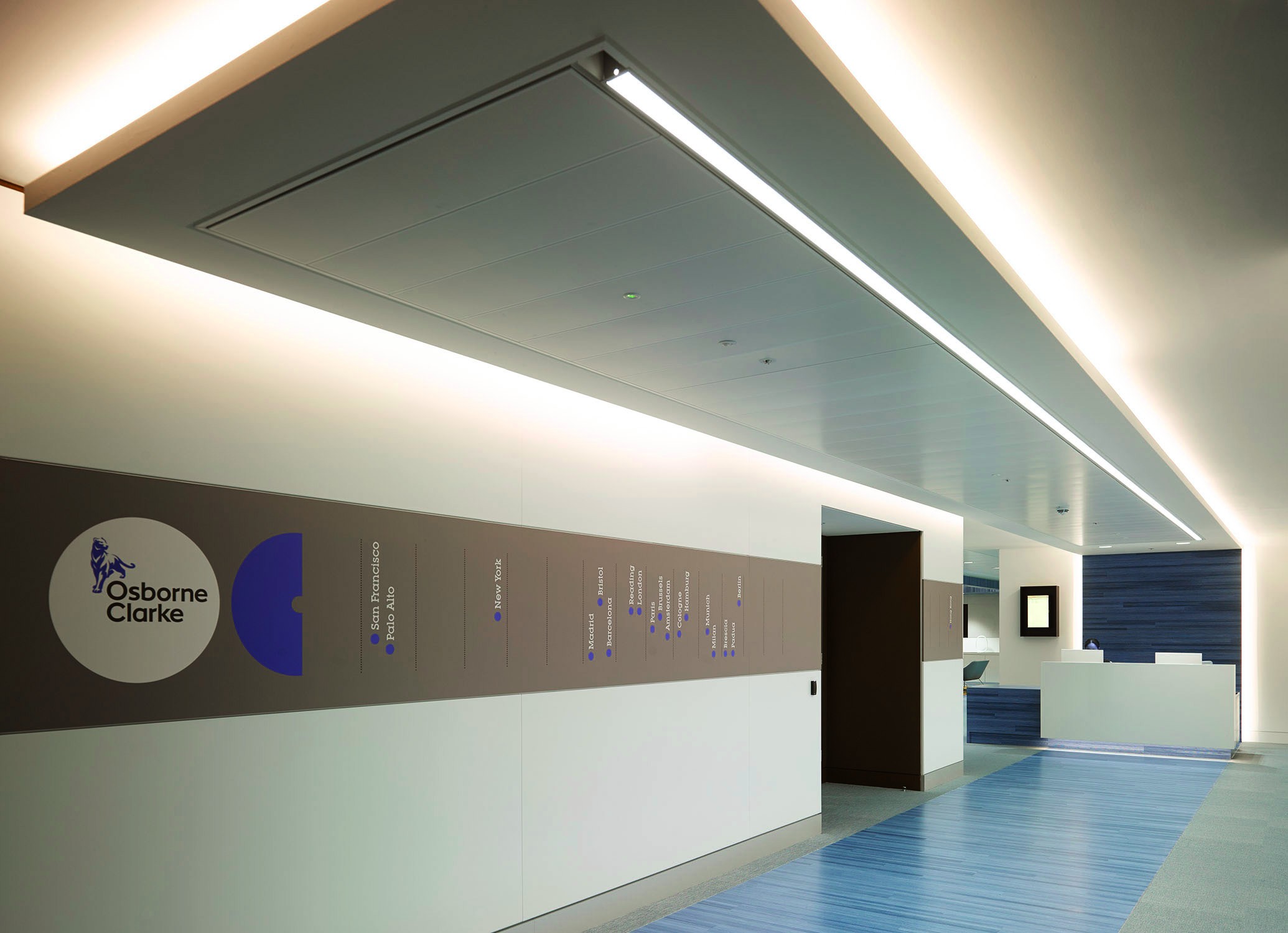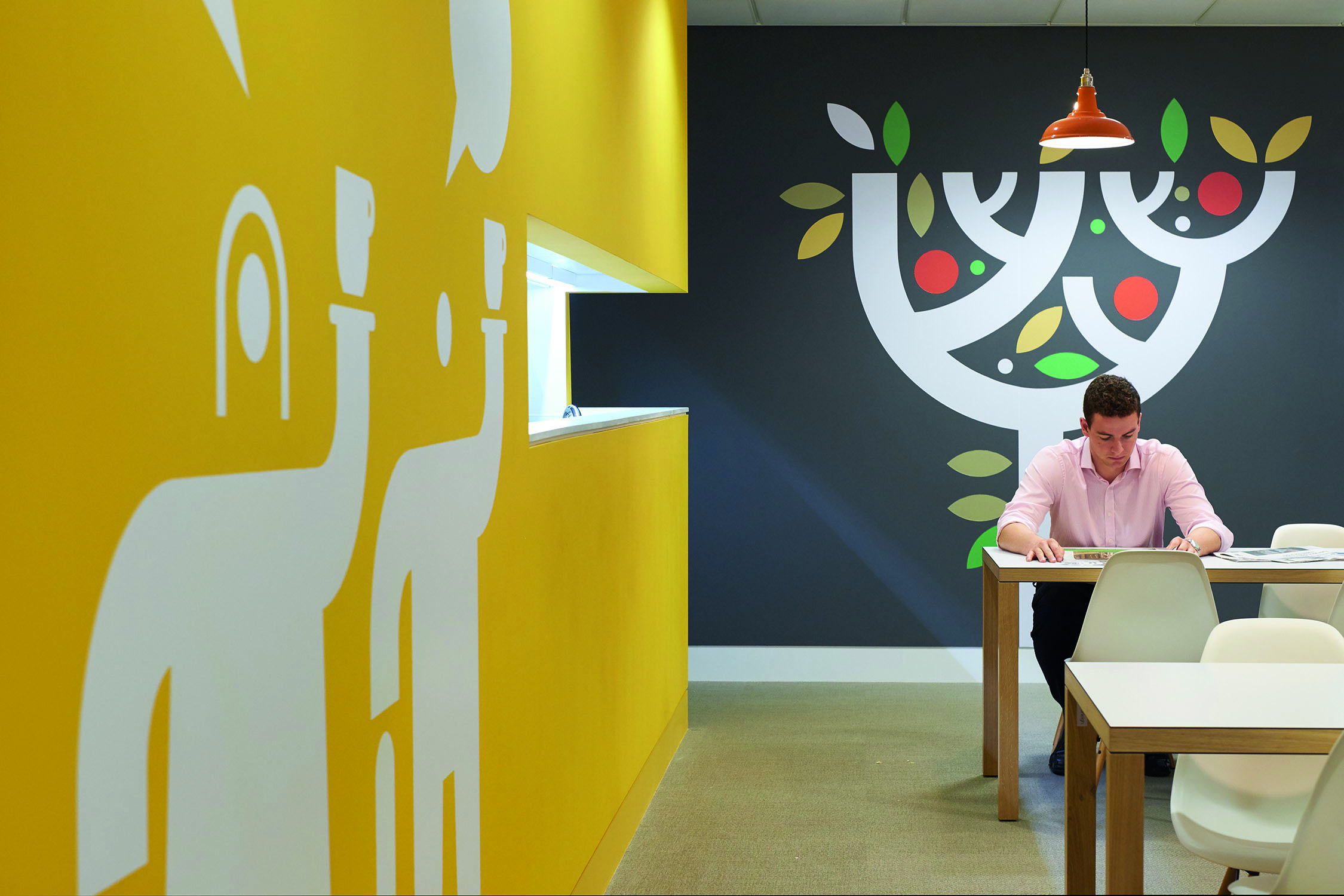Best Recruiter – National/Large Regional Firm
Shoosmiths

Best Recruiter – National/Large Regional Firm
Best Recruiter – National/Large Regional Firm
Osborne Clarke LLP

The firm prides itself on its friendly and approachable culture and this is very much in evidence during the recruitment stage.
‘Going into battle’, ‘coming under fire’ – descriptions of legal life may be riddled with martial metaphors but few would go so far as to draw real parallels between the life of a lawyer and that of a soldier. Yet for trainee William Pullan – formerly of 4th Battalion, the Rifles– there are several significant crossovers. “My working environment here is dry and warm,” he jokes. “Quite different to the Brecon Beacons in January! But it’s good to know that you can take the skills and communications you have learnt in a previous career and apply them here.”
Osborne Clarke is very open, very collegiate, a high-support culture – this makes us attractive to people from non-traditional backgrounds
‘Here’ is Osborne Clarke, which has just snagged its second consecutive LCN Award for Best Recruiter – National/Large Regional firm. And while William’s CV might make him stand out at some firms, he is by no means unusual at Osborne Clarke for having enjoyed a previous career.

Training principal Catherine Wolfenden explains that the firm actively seeks out candidates who have thought hard about why commercial law is for them and are not simply following the well-trodden path of: law at A level, law degree, straight onto an LPC. “Obviously, we do find exceptional candidates who have taken this route,” she says. “But it’s actually quite unusual to have thought hard about what it is you want to do and to be that certain from such an early age. While we’re looking for evidence that candidates will have the intellectual agility and capability to be a lawyer – the law is after all an academic profession – we don’t find it by looking at what university or LPC provider a candidate went to. We’re looking for proof that they’ve challenged themselves intellectually; that they have the ability to think in a way that is more than just providing legal advice – the opportunity to explore commercial experience including through work placements.”
Zoe Reid, senior recruitment advisor, backs this up: “Osborne Clarke is very open, very collegiate, a high-support culture – this makes us attractive to people from non-traditional backgrounds.” Certainly, William found that his army career was no barrier to settling in. “There are people from all sorts of background in my intake – those who’ve studied law and those who’ve had other careers first. It’s nice to have that mix.” In particular, he was impressed with the tailored nature of the support he received – after he accepted Osborne Clarke’s offer of a training contract, Zoe put him in touch with an ex-RAF pilot also at the firm. “It was really good to talk to him about how he’d made that transition,” he recalls. “I remember thinking – they’ve gone beyond what’s necessary here.”
I believe that a firm with the size and stature of Osborne Clarke should be committed to growing and enhancing the legal profession as a whole
The firm’s outreach efforts start with Zoe and the graduate recruitment team – they tend to visit between 10 and 15 universities from October to December, covering not only all the big law fairs, but also striking out alone by putting together their own presentation evenings in an effort to attract attention from those who might not otherwise consider a career in law. The team is also working to develop links with student law societies, an increasingly important part of its recruitment strategy. “Every legal discipline is different,” Catherine argues, explaining Osborne Clarke’s willingness to think outside the box and to recruit so widely. “So we need to have a broad cross-section of candidates. We are after a diverse mix, which will grow the firm in different legal areas. A brilliant tax lawyer has different skills and character traits to those which make for a fantastic IP litigator.” She is under no illusions that this sort of diversity can happen without help. “Despite our best efforts, there will always be unconscious bias involved,” she points out. “A danger that we might recruit in our own image. For that reason, we look carefully at the make-up of our recruiters and ensure that we have a wide variety of people involved at all different levels. Three members of the trainee leadership group read through applications after the first sift – initially we get hundreds – and we all talk through our choices and argue them to each other. At the assessment centre we have people involved from partners to associates. Osborne Clarke makes no secret of the fact that it is looking not just for academic excellence, but also commercial awareness and skills development. “In the application form, we want to see that a candidate can articulate themselves clearly and succinctly in the 250-300 word space,” Zoe explains. “That’s crucial.” However, applicants need not panic. “We’re not looking for the finished article – we are looking for evidence of raw talent, intellectual ability, the ability to strike up a rapport with new people, and the confidence to make themselves heard during group exercises. We want to see people pick up a business issue and run with it. As well as that, we want to see evidence of “soft skills” – that they’re articulate and confident individuals.” William went to a number of assessment centres and interviews – leaving the army and embarking on a career in law was not a decision he took lightly – but Osborne Clarke stood out for being a place he felt comfortable. “Even though there was the pressure that this was my number one choice, I always felt they put me at ease by the way they approached the process,” he recalls. “And it works both ways – if you’re at ease, people perform better. It was challenging – I was very aware that other people there are extremely high achieving – but the atmosphere was friendly and I came out feeling very happy with myself. Other assessment centres were not as pleasant.”

As should be apparent by now, the resources needed to provide a good training contract – let alone an outstanding one – are significant. Catherine confides that she is often asked why Osborne Clarke doesn’t simply recruit from the market, awarding jobs to qualified lawyers rather than training them in-house. “I believe that a firm with the size and stature of Osborne Clarke should be committed to growing and enhancing the legal profession as a whole,” she argues. “One of the most significant ways we can do that is by investing in a high-quality training programme. We treat our trainees as trainees, not as paralegals – they’re here to learn. We stress test whether each and every individual would benefit from doing a training contract with us – for this we have buy-in from the Executive Board down. Our trainees are the partners of the future – we need people who will build this firm.”
This fighting talk is borne out by William’s experience of his training contract so far and the quality of work he receives. At the time of writing he was in his second seat – banking – his first was in planning. “They’re poles apart!” he admits cheerfully. “Planning was very advisory with a lot of research; I was working closely with clients, coming up with hundreds of notices for big infrastructure projects. Banking is a lot more transactional. While it’s also client based, you see a lot more of other solicitors and there is masses of negotiation. I sit next to my supervisor – there’s always someone to speak to, for quick questions. It’s nice to have that safety net – you know you’re doing the best for your client.”
“In my opinion it’s the best they could hope for in a training contract,” Catherine asserts, when asked about the level of appraisal and support within the training contract. “The two years is more than trainees gaining their hands on technical experience, it’s about learning to become part of the Osborne Clarke family.” Trainees can expect to receive a mid-seat and end-of-seat review; they themselves set objectives at the start of the seat and then take another look at these mid-seat, updating them as necessary. “For instance, at the start of this seat I wanted to improve my drafting,” William recalls, “as there wasn’t much of it in planning. Now I’m getting into bigger matters, the churn of documents between parties, the ins and outs – I really feel that I’m fulfilling that objective.” In addition to these formal appraisals, all trainees have weekly meetings with their supervisor to check on workload and general progress.
Such investment is not indulgence; rather, it is an accurate reflection of the expectations placed on trainees and newly qualified lawyers – by both firms and clients. “They need to demonstrate commercial drive and business focus and to know what they want,” Zoe maintains. “From our side, we’re seeing a greater interest in a career as a lawyer – we now receive more applications than ever before. It’s a highly desirable career.”
Given this, it’s perhaps little surprise that Osborne Clarke makes such efforts to set itself apart – fortunately, its main selling point appears to come naturally. “We are what we say we are,” Zoe laughs. “From all our marketing literature to every single one of our interactions, we are a high-support, high-challenge environment. We are selling what we are – it’s not a false dream. We are true and honest, and that resonates with people.”
“Mark Wesker, the Bristol training principal, talked to us at our induction about when he was a trainee and the trepidation he felt,” William muses. “And he remembered being told: if you make a mistake, we will make it right again. It’s reassuring to hear that from the higher echelons of the firm – to know that if you give your all, they’ve got your back. For instance, if I send an email to a client, my supervisor might follow it up, just to supplement the background. Mistakes will happen – it’s not a total catastrophe.”
And while William enjoys the fact that he is considerably more comfortable in Osborne Clarke than in his previous army career, he’s even happier to discover that the best aspects of military life can be found in a law firm too. “It’s the teamwork,” he says simply. “There, I was a platoon commander with the infantry; I was working with serjeants, corporals, riflemen and company commanders. Here, I’m in a department with two partners, associate directors and associates – everyone has a level, everyone’s working together and there’s that same sense of camaraderie.”

Best Recruiter – National/Large Regional Firm
The firm prides itself on its friendly and approachable culture and this is very much in evidence during the recruitment stage.
Best Recruiter – National/Large Regional Firm
Osborne Clarke LLP

The recruitment process was fantastic. Everyone was very friendly and supportive, and I was made to feel at home.
“Every trainee at Osborne Clarke is treated as an individual”, says Osborne Clarke’s Training Principal Catherine Wolfenden when asked about the secret of the firm’s graduate recruitment success. And what a success it has been – a three-time consecutive winner of LCN’s award for best recruiter, national large/regional firm, Osborne Clarke is lightyears ahead in its ability to not only catch, but retain, the best talent in the industry.
This achievement is in no small part down to the firm’s ability to make its recruits feel valued. “Everyone’s career is different and everyone’s needs vary”, Catherine continues. “We approach our recruitment knowing that diversity is vital and, when trainees then join us, it’s about working with them to identify how best they can succeed in their career with Osborne Clarke.”

This focus on embracing individuality is echoed across all levels of Osborne Clarke, and was key for current trainee Busayo Yusuff, who is undertaking the third seat of his training contract with the firm. “I felt like the people I interacted with throughout the recruitment process made the effort to find out about me,” he explains. “If you’re able to get to the interview stage, they already know you meet the academic and intellectual requirements. The question comes down to whether you feel comfortable here and if it is an environment in which you can learn and thrive.” As is standard practice at Osborne Clarke, Busayo first attended a two-week vacation scheme, through which he had the opportunity to get under the skin of the firm, gaining first-hand experience in its offices.
We approach our recruitment knowing that diversity is vital and, when trainees then join us, it’s about working with them to identify how best they can succeed in their career with Osborne Clarke.
Vacation schemes are an important aspect of the firm’s recruitment strategy, according to Graduate Recruitment Manager Zoe Reid: “We try to see as many people in person as we can, so we can get to know them and they can get to know us. We recruit heavily through our vacation schemes, so if candidates are successful at our assessment centre it normally progresses through to a vacation scheme offer. It’s a two-way process – applicants get to see if we’re the right firm for them and we get to see them in our working environment.”
The view of recruitment as a process of give and take is an indicator of the importance the firm places on its trainees, and as Busayo soon found, people around the firm are always happy to talk through Osborne Clarke’s approach with potential new recruits. “I spoke to one of the current trainees at the firm to get the inside scoop on the direction the firm was going in, which was positive – the firm has gone through numerous years of back-to-back growth and opening offices in international locations,” he explains. This growth, as Zoe elaborates, makes the firm a very attractive proposition to anyone looking to enter commercial legal practice: “The firm is doing really well financially, is fantastically managed and has grown significantly over recent years, so there’s lots of really good opportunities for trainees to get involved in cross-border work. But it’s self-perpetuating – you put better people in and better opportunities come out.”
It is clear, then, that Osborne Clarke understands that its trainees are one of its most valuable assets, and that if the firm looks after its emerging talent, both parties will reap the long-term rewards. As Catherine suggests, “we are recruiting our lawyers of the future – they are the lifeblood of the firm, so we take their recruitment very seriously.”
We are recruiting our lawyers of the future – they are the lifeblood of the firm, so we take their recruitment very seriously.
So what does Osborne Clarke look for in a potential trainee? According to Catherine, the first thing is simple: “We’re looking for people with potential. We also want people who have a genuine interest in business and the legal profession. It’s really important to us to find candidates who are interested enough to have spent time thinking about the type of firm they want to go into; and who know what’s going on in the sectors in which we work.” Last but not least, Catherine reveals, the firm is looking for applicants who really run with the opportunity they have been given: “We look for people who are genuine self-starters and who take ownership of their careers with us – they really stand out.”
A testament to the success of the firm’s recruitment strategy, Busayo has these qualities in abundance. Providing some insight into his experience thus far, he begins with what first attracted him to Osborne Clarke: “My initial attraction was to the firm’s presence in corporate digital business. Two transactions in particular stood out – the first was when the firm acted for Beats on its acquisition by Apple and the second was when it acted for KPMG on a venture agreement with McLaren Formula One.”

The quality of work did not disappoint once he started: “One of my friends started her training contract at the same time as me at a different firm and we have mirrored seats – although she works on higher-value deals, the responsibility that I have is greater. I get better quality work and more client contact.” Osborne Clarke clearly fosters this hunger in its trainees, and therefore gets the best out of them.
But of course, it is not just about what recruits can give to the firm, but what the firm can give to them, that makes Osborne Clarke such a successful recruiter. The support that the firm offers at every stage of their journey to becoming a lawyer demonstrates its commitment to helping to build each of its trainees’ careers. At first glance, the firm’s recruitment process is relatively traditional, as Catherine explains: “For graduate recruitment we follow the traditional cycle of working with our team and the trainee leadership group”.
Zoe expands on the process that applicants can expect to go through: “The first step is an online application form and verbal reasoning test, and then I review all the applications – we look at every application from start to finish and we don’t screen out on the basis of academics.” Zoe then narrows down the pool and sends the applications through to a partner group, who decide who makes it through to the assessment centre. The assessment involves a group presentation, a written assignment and a psychometric test. As daunting as assessment days may be, “if I had needed any additional support it would have been given to me,” assures Busayo, and it is this nurturing culture that sets Osborne Clarke apart from its competitors. “I felt fundamentally comfortable, which is what it came down to,” he says. “It was important to me to be in an environment during my training contract where I could not only learn, but where I could be myself.”
One of my friends started her training contract at the same time as me at a different firm and we have mirrored seats – although she works on higher-value deals, the responsibility that I have is greater. I get better quality work and more client contact.
Osborne Clarke’s top-down commitment to recruitment excellence is evident. “The partners are very much involved in the whole process. This means that the candidates get that extra exposure to the partner group – they’re visible through the entire recruitment process,” observes Zoe, illustrating the open-door ethos of the firm. This approach is mirrored by the open-plan offices, still a relatively rare phenomenon in the legal world. “A lot of candidates will comment that they really enjoy the open-plan environment and find that very different to other law firms. This collegiate environment is definitely something that really helps us to differentiate ourselves.”
Both Catherine and Zoe, who have been involved with graduate recruitment at Osborne Clarke for five and 11 years respectively, attest to the firm’s supportive culture as unprecedented in the industry. Others in the profession often don’t believe it until they see it, as Catherine divulges: “Osborne Clarke is presented on the fact that the culture is supportive, collegiate and not ‘eat what you kill’. Some laterally hired partners first take this with a pinch of salt because it just wasn’t like that at their previous firms, but they soon find that it’s true! People are supportive and it’s about working together, rather than a partner model which becomes very competitive – we are genuinely not like that.”
However, it is not just Osborne Clarke’s treatment of those to make it through its ranks that stands out. It is also the proactive nature with which the firm constantly looks to improve, with social mobility and diversity at the forefront of its recruitment strategy. “For us it’s not a tick-box exercise of making sure we have a certain number of people who will fit into a particular mould,” Zoe explains. “We’re looking for lots of different people with different skillsets and different backgrounds.” And these aren’t just empty words – putting its money where its mouth is, last December the firm signed up to the Rare Contextualised Recruitment Process.

“Rare layers over our recruitment process and helps us to identify candidates who might otherwise fall through the net,” Catherine explains. “The contextualised recruitment system allows people to input data when they apply to us. It will flag up a candidate who has identifying characteristics. If there’s someone who didn’t have stellar A-level grades, the contextual data tells us more about that person. We’re using Rare as one of our tools to drive the firm’s diversity and social mobility agenda – obviously we want to have a diverse workforce and we want to give opportunities to everyone who has the potential to be a fantastic lawyer.”
It is clear why Osborne Clarke’s approach to recruitment has been so successful, but this is something that has been hard-earned over the last decade. Now, with several awards under its belt, it feels like the firm has really hit its stride. “We’ve found that over the last couple of years our current process really works,” enthuses Zoe. “The teams are really happy with the trainees that are coming through, which shows that the work we’re doing on recruitment is paying off.” With the firm’s adoption of Rare’s practices, it seems that its future can only get brighter.
By

Best Recruiter – National/Large Regional Firm
The recruitment process was fantastic. Everyone was very friendly and supportive, and I was made to feel at home. It was also very open, transparent and honest, so I felt that the side of the firm I was seeing was real and not just put on for the recruitment period.

